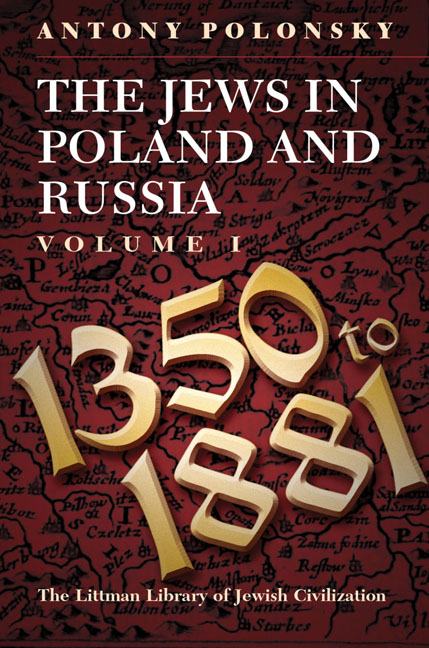Book contents
- Frontmatter
- Dedication
- Acknowledgements
- Contents
- List of Maps
- List of Tables
- Note on Transliteration
- Note on Place Names
- Maps
- General Introduction
- PART I JEWISH LIFE IN POLAND–LITHUANIA TO 1750
- PART II ATTEMPTS TO TRANSFORM AND INTEGRATE THE JEWS, AND THE JEWISH RESPONSE, 1750–1880
- Glossary
- Bibliography
- Index
General Introduction
- Frontmatter
- Dedication
- Acknowledgements
- Contents
- List of Maps
- List of Tables
- Note on Transliteration
- Note on Place Names
- Maps
- General Introduction
- PART I JEWISH LIFE IN POLAND–LITHUANIA TO 1750
- PART II ATTEMPTS TO TRANSFORM AND INTEGRATE THE JEWS, AND THE JEWISH RESPONSE, 1750–1880
- Glossary
- Bibliography
- Index
Summary
HAYIM NAHMAN BIALIK, the Hebrew poet, in a letter written in early January 1906 to the Yiddish writer Shalom Aleichem, observed, ‘No country is better for [the Jews] than Russia …’. He was entitled to think so. In the 130 years prior to his letter, hasidism had developed within the tsarist empire as a major religious revival, its mitnagdic opponents had created the great Lithuanian yeshivas, Hebrew and Yiddish literature had flourished, and new political movements, above all Zionism and Jewish socialism, had emerged and transformed the Jewish political landscape.
However, within little more than a decade the Bolshevik Revolution had taken place and Stalin's subsequent seizure of power destroyed the basis of organized Jewish life in Russia and its empire until it was restored with the collapse of the Soviet Union.
In his introduction to the collaborative history The Jews in Reborn Poland (Żydziw Polsce odrodzonej), published in 1932 and 1933, Ozjasz Thon, rabbi of the Tempel in Krakow and chairman of the Jewish parliamentary club in the Sejm (the Polish parliament), asked, ‘What is the role of Polish Jewry today; what is its mission?’ He continued: ‘Both quantitatively and qualitatively its mission, which it will soon take up, is to assume the leadership of world Jewry.’ This was a task which he believed it alone was capable of undertaking, given the spiritual and material devastation of Soviet Jewry and the lack of freedom in which it lived, and the loss by American Jewry, under the pressure of assimilation, of its specific Jewish character. Polish Jewry possessed the ‘genuine’ character of Russian Jewry, but also, according to Thon, lived in the freedom enjoyed by American Jews. He foresaw a splendid future for the Jews of Poland:
Polish Jews in the past have on occasion determined the character of world Jewry. There were moments when the genius of the Jewish people reached its full flowering in Poland. I am convinced that events are again creating a situation in which in Poland there will emerge one of the great centres of the Jewish spirit.
Yet within seven years Poland had ceased to exist, partitioned between Nazi Germany and the Soviet Union, and the destruction of Poland's huge Jewish community was about to commence.
- Type
- Chapter
- Information
- The Jews in Poland and RussiaVolume I: 1350 to 1881, pp. 1 - 4Publisher: Liverpool University PressPrint publication year: 2009

